Can 'Operation Chokehold' be stopped? Will you join the AT&T DoS?

The strangeness spinning around AT&T's quality of service is starting to make Christmas feel like Halloween. It's scary and tantalizingly inviting to observe. It's like watching a train wreck or freeway pileup in horror and awe. Does Apple have an app for that?
Tomorrow, a service which reliability many customers have questioned, may be intentionally brought down. Whether or not there is any action or even if it fails, everything is different now -- not just for AT&T but any company looking to manage customer relations. The crowd has found a voice. Will the AT&T mob be more American Revolution or French Revolution and its "reign of terror?"
10 Things you shouldn't give Steve Ballmer for Christmas

Microsoft CEO Steve Ballmer is a man who has pretty much everything. That makes him a difficult person to buy holiday gifts for. God forbid, if you're the Microsoft employee who picks Ballmer's name to be his secret Santa. Just because Ballmer might have everything, doesn't mean you should buy him anything.
I couldn't resist putting together a list of things not to buy Microsoft's chief executive. It might seem like a slow news day thing to do. In fact, Tuesday was a busy news day. This is all just holiday fun.
Ask Santa for one of these compact digicams for Christmas

Are you shopping for or asking Santa for a compact digital camera this holiday? Sure, it seems like everyone who is anyone wants a digital SLR for their Christmas stocking. But compacts have their place -- and a newer crop are closer to digital SLRs in performance and photo quality.
But to be fair, close is still a long ways off. Shutter response, action shooting, optical viewfinder, photographic quality and changeable lenses all put dSLRs way ahead of compacts. Still, compacts can be easily carried pretty much anywhere, and many newer models sport surprisingly pro features.
Europe gets off Microsoft's back -- ends browser antitrust case

Microsoft's Web brower antitrust troubles in Europe are essentially over. Starting in mid-March, European Windows users will have option to choose the default Web browser. Microsoft also will embark on a new interoperability initiative.
In a press conference today, the European Union's chief antitrust enforcer, Neelie Kroes, described the situation she sees about browser choice: "It is as if you went to the supermarket and they only offered you one brand of shampoo on the shelf, and all the other choices are hidden out the back, and not everyone knows about them. What we are saying today is that all the brands should be on the shelf."
Do you want Bing for iPhone? There's an app for that

Earlier this evening, Microsoft formally announced a new search app for iPhone on the Bing Community blog. The Bing app is available now from the App Store, complete with voice search. I emphasize the now because the app has a December 16 release date on the 15th.
Based on a very quick, cursory look, Bing is a competent iPhone app, tapping into the kind of capabilities expected from the platform. Bing fits nicely into the App Store repertoire. I wouldn't call the features revolutionary -- Apple and Google are there already with advanced mapping and GPS -- but the packaging appeals, and Microsoft manages to offer a user experience that is fairly consistent with Bing Web search.
Are you a Net vet or a couch potato?
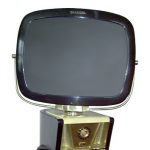
The question is worth your answer (in comments, please), following data released by Nielsen and NPD over the last 40 hours. According to Nielsen, U.S. Internet users spent an average 66 hours 24 minutes and 44 seconds on a PC in November. An average 6 hours 10 minutes and 6 seconds spent on the Internet went to Facebook.
But for all the talk about newer technologies -- whether Hulu and YouTube streaming or iTunes and iPods -- NPD claims that more Americans still consume traditional media. The data strangely juxtapositions with advertising spending trends.
Grey market devices boost declining 2009 mobile phone sales
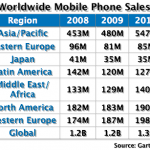
Worldwide Mobile phone sales will nudge down in 2009 compared to 2008 rather than sharply decline. In forecast data released by Gartner today, global handset sales will reach 1.214 billion units, down 0.67 percent from 2008. Three months earlier, Gartner forecast a 3.7 percent year-over-year decline in sales. Gartner tracks actual sales to end users, not shipments to carriers or retailers.
While bloggers and other pundits like to talk up iPhone as the competitor that will unseat global market leader Nokia, the threat is elsewhere. "The grey market will affect Nokia's market share the most," Carolina Milanesi, Gartner research director, said in a statement. Grey market sales have increased throughout the year, with surprising tenacity, and they're spreading.
Number of Apple sites' unique visitors rises as iPhone and Mac sales surge

In November, Apple burst into the Top 10 U.S. parent Websites, as measured by number of visitors. Nielsen released the data earlier today. Apple has been in the list of Top 10 Web brands for some time, but its appearance in the "Top 10 Parent Companies/Divisions" is unusual.
The Nielsen Wire blog explains the difference between parent and brand levels: "The parent level is defined as a consolidation of multiple domains and URLs owned by a single company or division. The brand level is defined as a consolidation of multiple domains and URLs that has a consistent collection of branded content."
Microsoft should take Zune to the cloud, offer music for any device
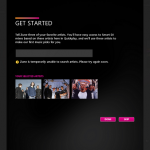
There has been much speculation and punditry about why Apple bought music streaming/sharing service Lala, with cloud services being the biggest reason. I don't agree with this cloudy reasoning, but it got me to thinking that a music cloud service would be helluva good idea for Microsoft -- and the company has been there before.
Apple wasn't motivated to buy Lala to offer cloud services, even though that may eventually be the outcome. As I explained last week, Apple has two conjoined objectives: Thwarting Google competition and improving music discovery. Strangely, Microsoft shares the same reasons and has another: A broken mobile OS/device strategy.
Google Nexus One phone rumors show the power of buzz
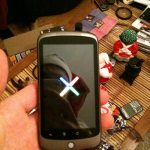
Rumors and scattered confirmations that Google would sell its own, branded Android-powered phone are seemingly everywhere this weekend. The noise is so loud as to essentially quiet persistent rumors about an Apple tablet. That alone is some feat. The buzz reminds me of the rumors before Apple announced the iPhone in January 2007. Cover your ears. The noise is deafening.
The rumors don't need to be true. The buzz is benefit enough to Google. Buzz like this -- the kind Apple has commanded for years -- creates an aura of innovation about a brand, raises higher a brand's profile and, for a public company, lifts the share price and analyst evaluations. Also, the rumors break during a typically slow news cycle -- the holidays and ahead of the Consumer Electronics Show in January -- further heightening the buzz. For the last several holiday seasons it was Apple buzz building during the holidays. Now it's Google.
If the Obama Justice Department guns for Google, is Microsoft safe?

Microsoft reached a surprising milestone this week. In a routine court filing, the U.S. Justice Department and handful of attorneys generals asserted that Microsoft's communications protocol disclosure is "substantially complete." Finally. The Microsoft that once beat Netscape senseless had finally bowed before the great government overlord. Perhaps for good reason. There's a new sheriff in town, looking for bad guys to jail.
The Obama Administration appears ready to legally take on dominant companies in a way the Bush Administration simply wouldn't. In May, the Wall Street Journal claimed that the Obama Administration had put together an antitrust watchlist, on which there is Google's name, among others.
Microsoft isn't losing its consumer edge, it was game over long ago

I disagree with Mark Anderson, writer of the Strategic News Service, about Microsoft's future. Last night, at his 10th annual "Predictions Dinner," Anderson asserted that in 2010 Microsoft would lose "its consumer play. Specifically, "except for gaming, it is game over for [Microsoft] in consumer. This will make consumer the place to be, where the most robust and exciting change artists will work." His prediction isn't the future. It's the past.
Microsoft has been retreating from the consumer market for some time, following a deliberate strategy that is creating a circa-1980s IBM. Two days ago, I blogged about how Apple applies what I call "David Thinking" to challenge the status quo. Apple plays off its strengths to change the rules. By comparison, Microsoft is using its strengths to preserve the status quo, isolating the company to the enterprise. I've written about this IBM-transformation many times. In context of Anderson's prediction, it's good time to again explain Microsoft's consumer-losing strategy.
The strange parallels between Microsoft's century start and decade's end
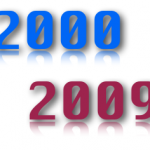
End of year is typically time for company retrospectives, but 2009 is also end of decade. For Microsoft, the slow economy and push into Web services bookends the decade 2000-2009. Microsoft parallels between the new century's first year and the decade's last year are surprising. I've put together a list of 10 things, presented here in no particular order of importance.
1. Microsoft struggled through recession. In December 2000, Microsoft issued an unexpected profit warning for its fiscal 2001 second quarter. In January 2009, Microsoft released disappointing 2010 second quarter results, announcing intent to lay off 5,000 employees. Recessions marked the beginning and end of the decade, hitting Microsoft sales hard.
Deep discounts drive Black Friday tech revenue down, unit sales up
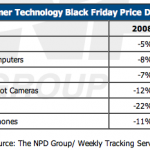
The sour economy soured consumer technology retail revenue on Black Friday, according to new research from NPD Group. Related, U.S. retail pricing declined year over year in all major categories -- camcorders, GPS systems, LCD TVs, notebook computers, point-and-shoot digital cameras and stereo headphones. NPD did not publicly report pricing on cell phones or desktop PCs. The company tracks online and brick-and-mortar sales.
Black Friday revenue declined for a second year in a row -- both days since the late-September 2008 stock market crash that sent an already recessionary economy tumbling downward. Overall Black Friday revenue was $2.7 billion at U.S. retail, down 1.2 percent from the same day a year earlier. On Black Friday 2008, year-over-year revenue fell 3.4 percent.
iPhone brings back the DOS dilemma
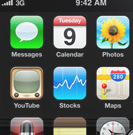
Apple's iPhone is supposed to be about the cool, new mobile Internet future. But using the smartphone reminds me too much of the past. The beautiful, ergonomically-designed iPhone has two related flaws: Fixed battery and prohibited background applications. Apple wrongly chose to put form before function in designing iPhone hardware and software.
The device's related flaws remind me of MS-DOS PCs' 640k memory limit. Microsoft used digital steroids -- extended and expanded memory -- to bulk up MS-DOS. But it was never enough to make up for what memory limitations took away from DOS' performance or stability.
Joe's Bio
Joe Wilcox is BetaNews executive editor. His motto: Change the rules. Joe is a former CNET News staff writer, JupiterResearch senior analyst, and Ziff Davis Enterprise Microsoft Watch editor.
Ethics StatementBetaNews, your source for breaking tech news, reviews, and in-depth reporting since 1998.
© 1998-2025 BetaNews, Inc. All Rights Reserved. About Us - Privacy Policy - Cookie Policy - Sitemap.
